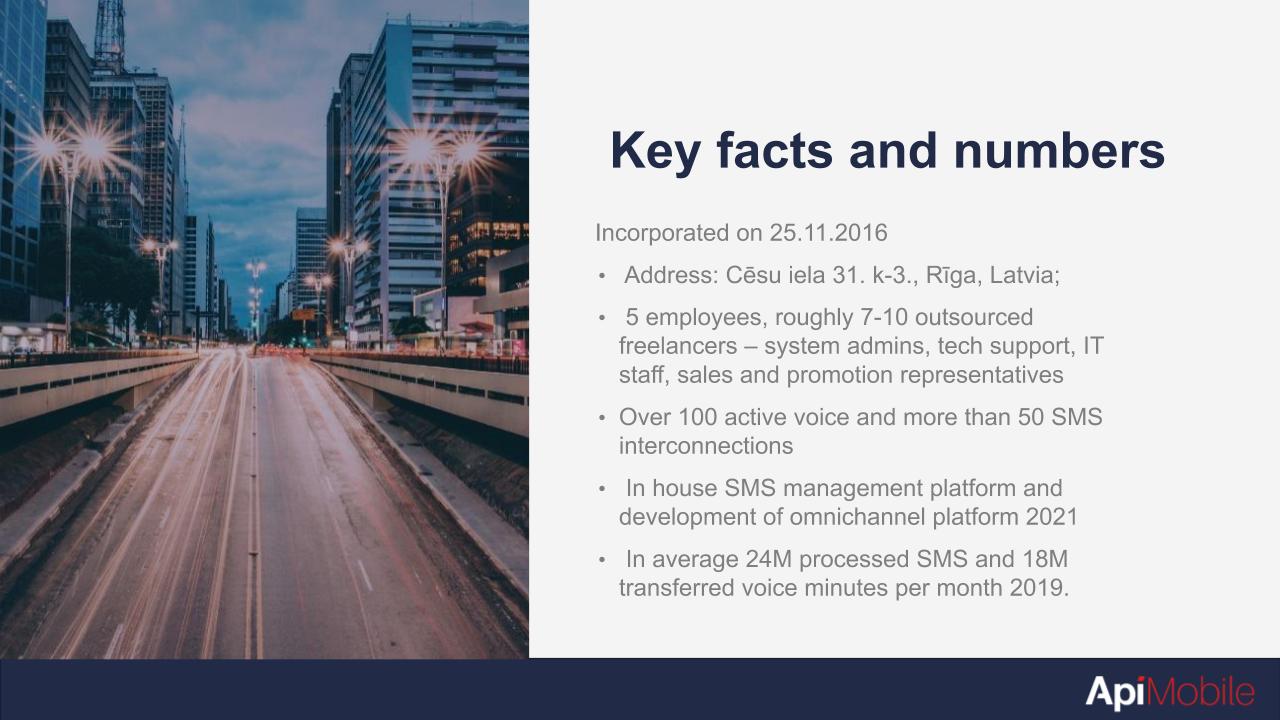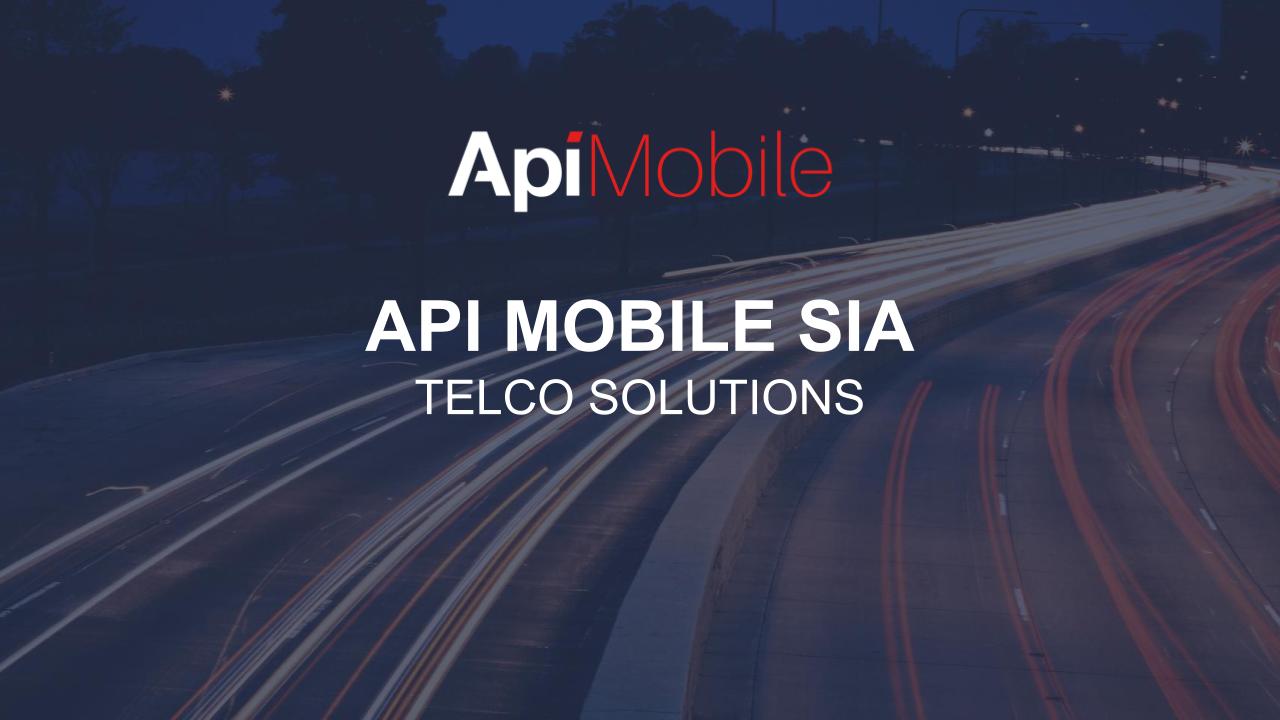Mission of Api Mobile
Api Mobile’s mission is to harness state-of-the-art technology, a spirit of innovation and sound business practices to facilitate mutually beneficial relationships within the global telecommunications marketplace, by providing efficient, quality services to clients and stakeholders, with the highest degree of integrity. Api Mobile nurtures and promotes entrepreneurship by providing technical and financial solutions to its customers and investors governed by fairness and transparency.
Management
Api Mobile’s management has 50+ years of wide and varied telecommunications and related IT experience, combined with financial expertise grounded in fundamental principles and with real world know-how. It worked in the c-suites of some of the top telecommunications companies in the world, grew start-ups that began on its kitchen table, built private networks around the globe and consulted on, and helped fund, infrastructure projects in over 25 countries.
Partners and technology
Api Mobile’s business partners range from large PTTs to mid-sized wholesalers and resellers to small vendors focused on just a few routes. To insure the integrity of our trading environment, all involved carriers pass a rigorous credit assessment and are insured by world leading credit risk insurers to provide peace of mind for all involved. Whatever the distance or technology, Api Mobile is managing its interconnections quickly and efficiently over its superior technical infrastructure and state of the art business support platform, based on web-driven software built on telecommunication industry standards like H323, SIP and Frame Relay, SS7 and utilising industry leading equipment from CISCO, SANSAY, DIALOGIC, MERA and IVR Technologies, all of them under Session Border Controller (SBC) policies and the highest security environment.
Api Mobile is based in Riga, Latvia and is very well connected in the telecommunications area worldwide.
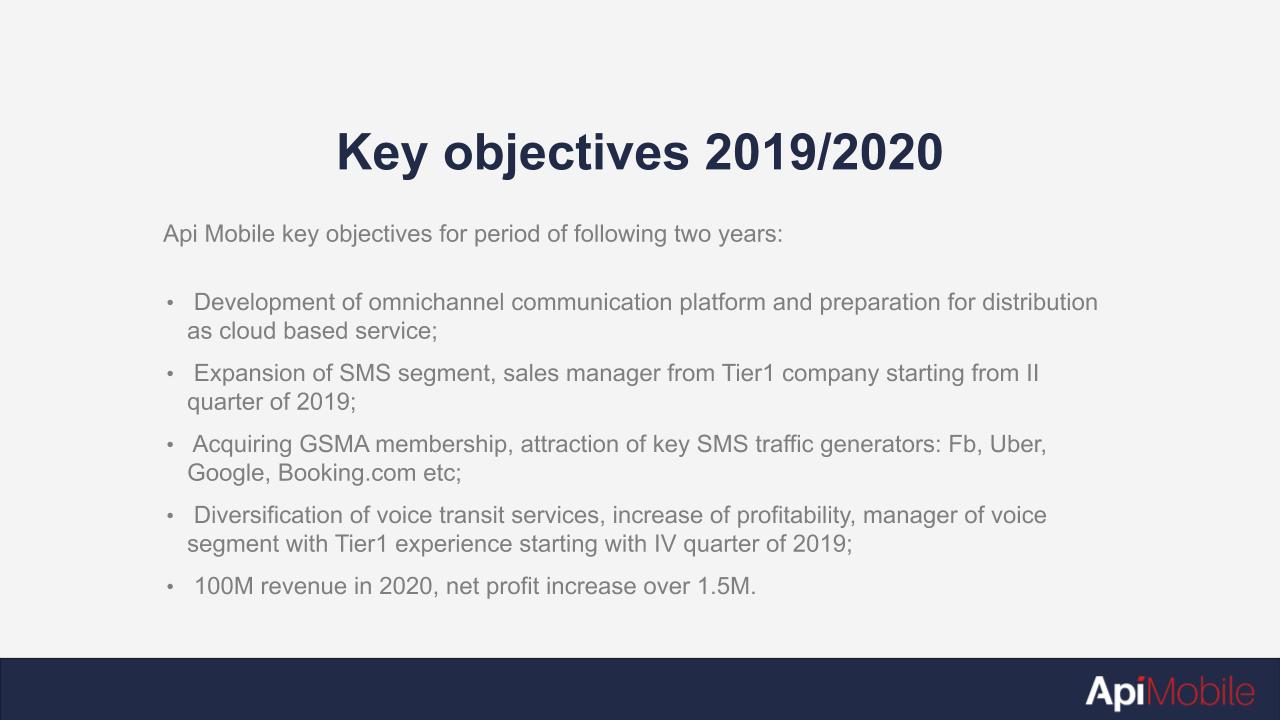
Api Mobile
is engaged in the international wholesale of voice and SMS transfer, which means that Api Mobile connects to telecommunication companies and offers voice and SMS communication connections to various international destinations to its customers. An obvious example would be: Api Mobile has an interconnection with a company capable of delivering mobile voice calls to one of Tunisia’s telecommunications networks, such as Orange, at a price of EUR0.2745 per minute, Api Mobile has a customer with a constant traffic to this operator’s network and the customer is ready to pay EUR0.2749 for a high quality connection. The international telecoms market is not very homogeneous and consists not only of large and recognisable Tier1 companies, but also of smaller scale companies that provide services to B2B customers, tech companies, and sectors that are not directly interested in interconnecting with leading market players. Api Mobile is a relatively young, mid- sized company, but as it is made up of a team of experienced telecommunications professionals, it creates the preconditions for a relatively rapid growth of Api Mobile. The total count of mobile phone users in the world continues to grow at the expense of developing countries, and while the decline in end-user costs prevents the market from experiencing significant growth, global telecom revenues continue to remain stable. the Issuer’s customers and suppliers are foreign companies that use the opportunities provided by Api Mobile to connect to world-class companies to whom it would not be economically viable to establish direct interconnections.
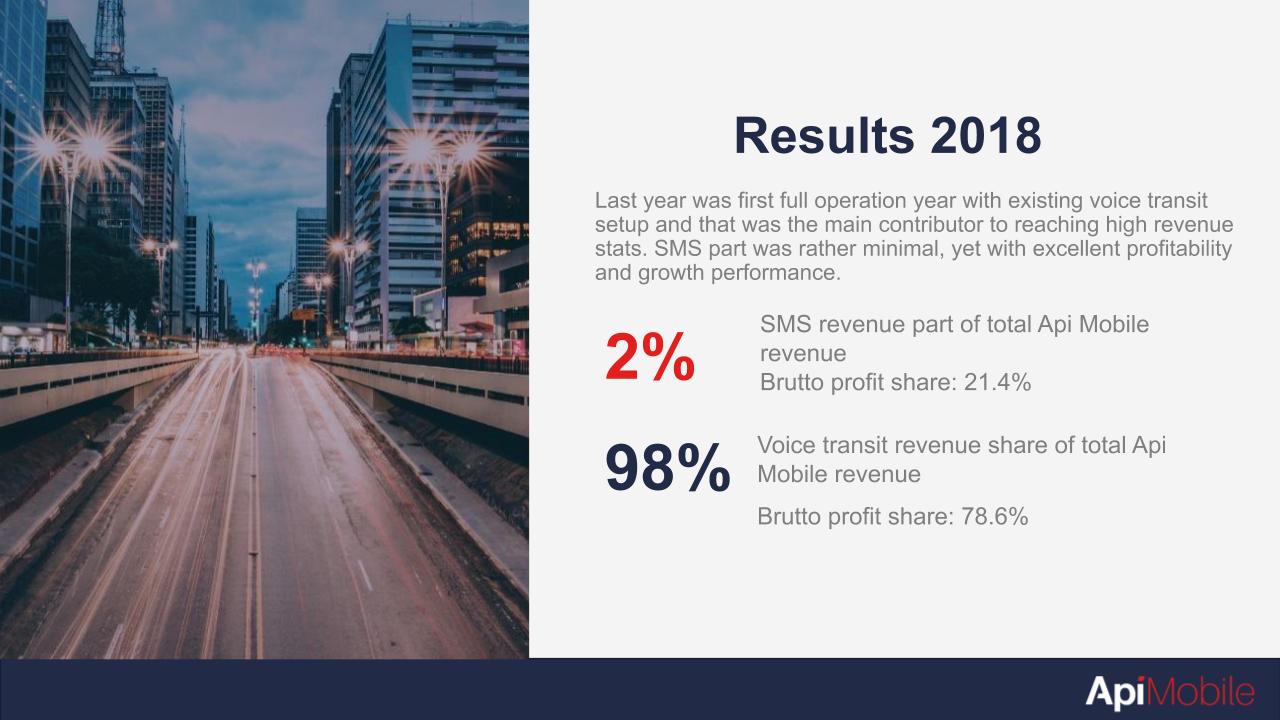
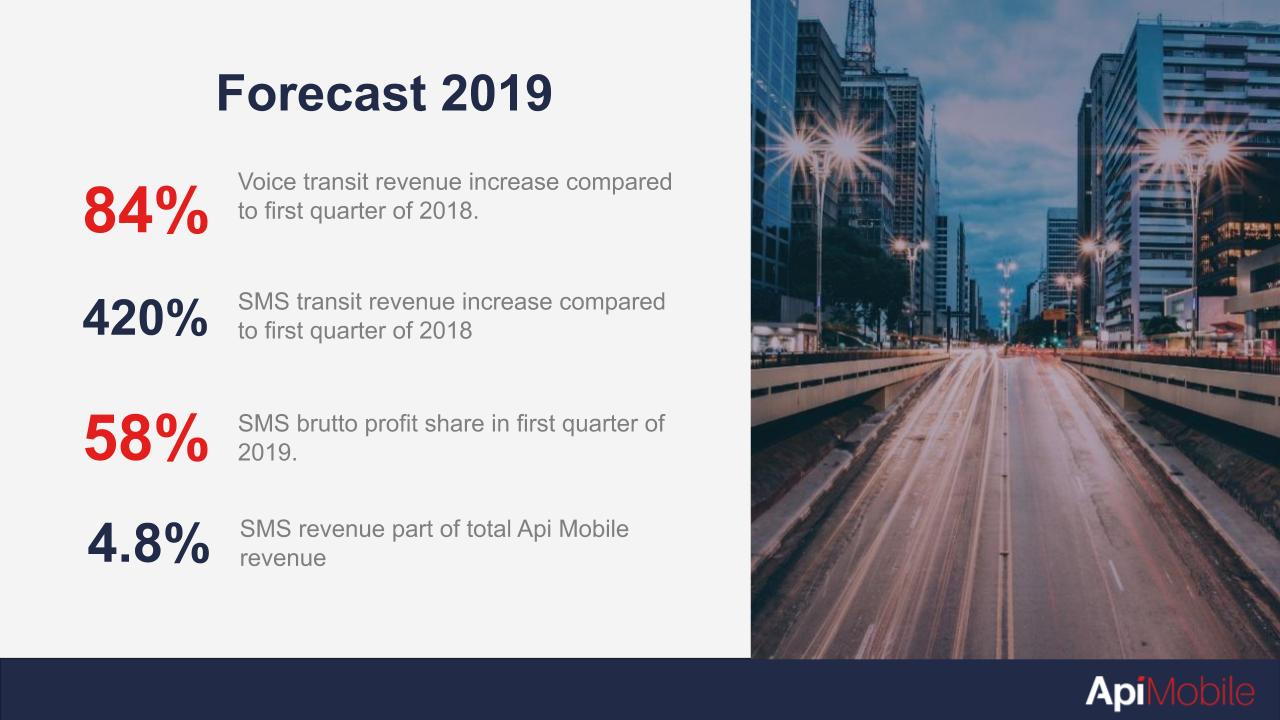
Services
Api Mobile offers the establishment of Voice Transit Interconnection and SMS delivery service with Tier1 / Tier2 companies, enabling corporate customers to choose the least resistance path – to build relationships with Api Mobile and send calls or SMS through global player networks without direct relationship with them. It is way more cost-effective and technologically simpler than concluding a co-operation agreement with, for example, British Telecom, that may take about a year to make systems adapt to the technological requirements of BT, which include a long period of safety and technological compliance testing and a relatively large advance payment unavailable to the most of Api Mobile existing and potential customers. As a result, companies with voice or SMS communications to specific destinations (countries or specific operators) can choose Api Mobile as a communication partner to establish a partnership to benefit from competitive tariffs, simplicity of procedures, high network stability and quality of communications provided.
Quality assurance and network supervision
When starting a cooperation various inquiries are provided on the potential customer, KYC, goodstanding and credit risk assessment if that’s necessary. We have many years of cooperation with insurance broker Marsh, which helps to insure the Issuer’s customers at Coface or Euler Hermes. It should be noted that there are several thousand Tier2 and Tier3 telecommunications companies in the world, but the industry is generally relatively compact, therefore the circulation of information about customer or supplier credit, strengths or weaknesses is relatively easy to access, which lessens the occasional risk of fraud, yet it tends to happen anyway. After signing a co-operation agreement, testing of technological compatibility is done, which includes the exchange of the main characteristics of the used communication platforms, the establishment of interconnection and testing of its functionality. During the tests, a significant number of calls are made to make sure that all the main indicators are within the normal range. Each call is registered in the systems of both parties and becomes the basis for settlements between companies. Both parties keep records of the call details (CDR) according to the jurisdictional rules of each company and they consist of: start and end time of the call, total call duration, caller number and call destination number, identifiers for both systems, specific destination per minute and a number of technical details identifier. Summing them up at the end of the CDR period, an invoice is issued for the calls made, which both parties compare to the CDRs stored by both systems and either confirm the invoice or raise a dispute within 30 days after invoice date. For the most part, the cooperation agreements contain a clause on if the call volume differences are between 1% and 1.5%, the bill is not to be disputed because the discrepancies in this amount can be caused by a number of technological factors that unfortunately cannot be completely eliminated by the modern technology.
When the collaboration is already underway, testing goes into the routine phase, and measurements of communication quality are almost continuous to prevent network operation problems that may cause customer dissatisfaction with the service provided. Measurements of each connection are regularly performed for the following characteristics: post-dial delay (PDD) how long it takes for the customer until the “call” signal is heard after number is dialed in, if this time is too long (too many interconnections/systems involved in route), in customers this may cause dissatisfaction; ALOC / ACD (average length of call / average call duration) average call duration measurement indicates the quality of the sound properties of a particular connection – if the average call duration for a particular destination (for example, from USA to Guatemala) is 5min30sec, but the duration decreases over the last 30 minutes to only 3min40sec, this indicates the need for in-depth testing as it indicates a decrease in sound quality indicators on a particular line; ASR (answer to seizure ratio) This measurement indicates how many calls from the overall calls are answered, the average is about 30% -40%, which allows you to keep track of the quality of the services provided by your suppliers – an inadequately low ASR indicator indicates low line capacity (carrier is not able to connect more than X calls and too many are rejected, indicating that additional line capacity is required), or a too high indicator (most of the calls seem to get connected) may indicate an error in the supplier system, which will later be returned to the supplier in an inappropriately large bill.
Vendors and customers
Api Mobile’s customers are EU and foreign telecom companies who need to deliver their customer calls to specific destinations. As a similar example in Latvia, CSC Telecom, that offers call services to Latvian companies, is collecting incoming calls from their customer to the CSC Telecom call center and the Issuer has to go to the market and choose the most advantageous cooperation partners that will deliver these calls to their final destinations. These can be either Tier1 companies or Api Mobile size and capability companies that may be more flexible and more specialized to specific geographic destinations, or to provide a particular service. The best deals in EU destinations in Latvia are likely to be available from Lattelecom or leading mobile operators, but Api Mobile may be able to offer more favorable conditions for its traffic to Latin America, the United States and Northern Africa. There are many telecommunication solutions in the world that create call flows through Tier2 and Tier3 market participants, but are not distributed in Latvia – such as calling cards (dialing through a card issuer center provides calls to a specific destination – for example, a calling card in the UK with 300 minutes would allow the customer to call to the UK in 300 minutes), which is common in several countries in Western Europe, as well as in the US. In order for this calling card service to be able to offer sufficient flexibility, competitive price and quality, service providers turn to the market for similar companies like Api Mobile and are in competition for the ability to deliver the above mentioned call flows.
Top 10 partners
| Quickcom |
| Telesign |
| Beepsend |
| Telecom Italia Sparkle |
| British Telecom |
| Speedflow Communications |
| Text2reach |
| Infobip |
| Monty mobile |
| Horisen |
| NRS Gateways |
Other partners
| Relario |
| A.A Smartcomtech |
| Monty UK |
| QLN |
| BSG |
| Advise Srl |
| MMD Smart |
| CallTrade |
| NRS Gateways |
| Crossingnet S.r.l. |
| NextGen |
| Belltex LLC |
| MrMessaging |
| Dexatel |
| Micro Ocean Telecom |
| Akton |
| Lanck Telecom |
| Twelve Telecom Ltd |
| Tech Alpha |
| Lirenas |
| Twelve Telecom Ltd |
| IT Decisions |
| Valccom |
| AlkaIP Telecom |
| SpeedFlow |
| VR Telecom |
| Antwerp Technologies |
| Alienics INC |
| KOL Infotech |
| OK Route |
| Mobiadvanced |
| Quickcom |
| Forty Two |
| Bankai |
| BWB Shpk |
| Lextel LTD |
| Signatel |
| SMS Provider Corp |
| Direct7 |
| All IP |
| Valccom |
| Vertex |
| Beepsend |
| Wavecell |
| Globe Teleservices Limited |
| SmartTel Plus OÜ |
| Intelli Messaging |
| SVM Telecom LTD |
| MTarget |
| Agile Telecom |
| Global Voice SRL |
| Broadnet |
| RDcom |
Business Strategy
Call handling on a platform
Api Mobile uses dedicated, certified software – Digitalk – to connect and maintain connections, which is one of the leading voice call platforms on the market. The call connection platform is maintained in a data center that ensures high data security against intrusion into the system and minimizes the risks of data theft by connecting to a custom VPN connection that excludes data theft on the data path from the user’s call platform to the server in the data center. The call platform performs call-forwarding and routing functions according to the technical settings. Billing and sending invoices to customers is done automatically by the platform at the end of the billing period. The most frequently used billing periods are 7 days (from Monday’s first second until Sunday’s last second), 15 days (from the first second of the calendar month to the last second of the 15th date, and from the first second of the 16th to the last second of the last day of the calendar month) as well as the monthly billing cycle (from the first second of the first day of a month to the last second of the last day of the month). Price announcements are sent and imported on the call platform and, together with the supplier connection quality scores, serves as settings for call routing. For each destination, there are often several prioritised vendors, and the technical settings are set up to ensure a stable connection. For example there is a need to provide a stable and cost-effective connection with Guatemala at a sales price of 0.1015 and the approximate composition of the technical settings by the suppliers could be as follows:
a) price 0.0950, ASR 35%, ALOC 5.04, parallel call capacity 350
b) price 0.0985, ASR 40%, ALOC 4.40, parallel call capacity 180
c) price 0.0995, ASR 30%, ALOC 5.45, parallel call capacity 270

The platform will primarily divert the calls to the vendor a, because he has the lowest price and comparatively good quality indicators. If the first supplier rejects the call and returns it to the system with the code 403, then the platform will attempt to connect to the supplier b, if it fails, then c, if it fails, it will return the call to the customer with the same technical code 403. Such development would lower Api Mobile ASR scores as well as worsen PDD scores indicating that we’re not able to deliver calls customers send to us. Therefore, the Issuer always keeps track of the optimal routing settings for all destinations to connect the highest number of calls possible at all times. As soon as the quality of a supplier’s connection starts to deteriorate and does not reach the expected results, it is manually replaced with another route whose price offer allows cost-effective operation, while the quality indicators meet the need to provide customers with a stable and quality service.
SMS Traffic routing
Api Mobile is currently also increasing their SMS Traffic within 2019.

